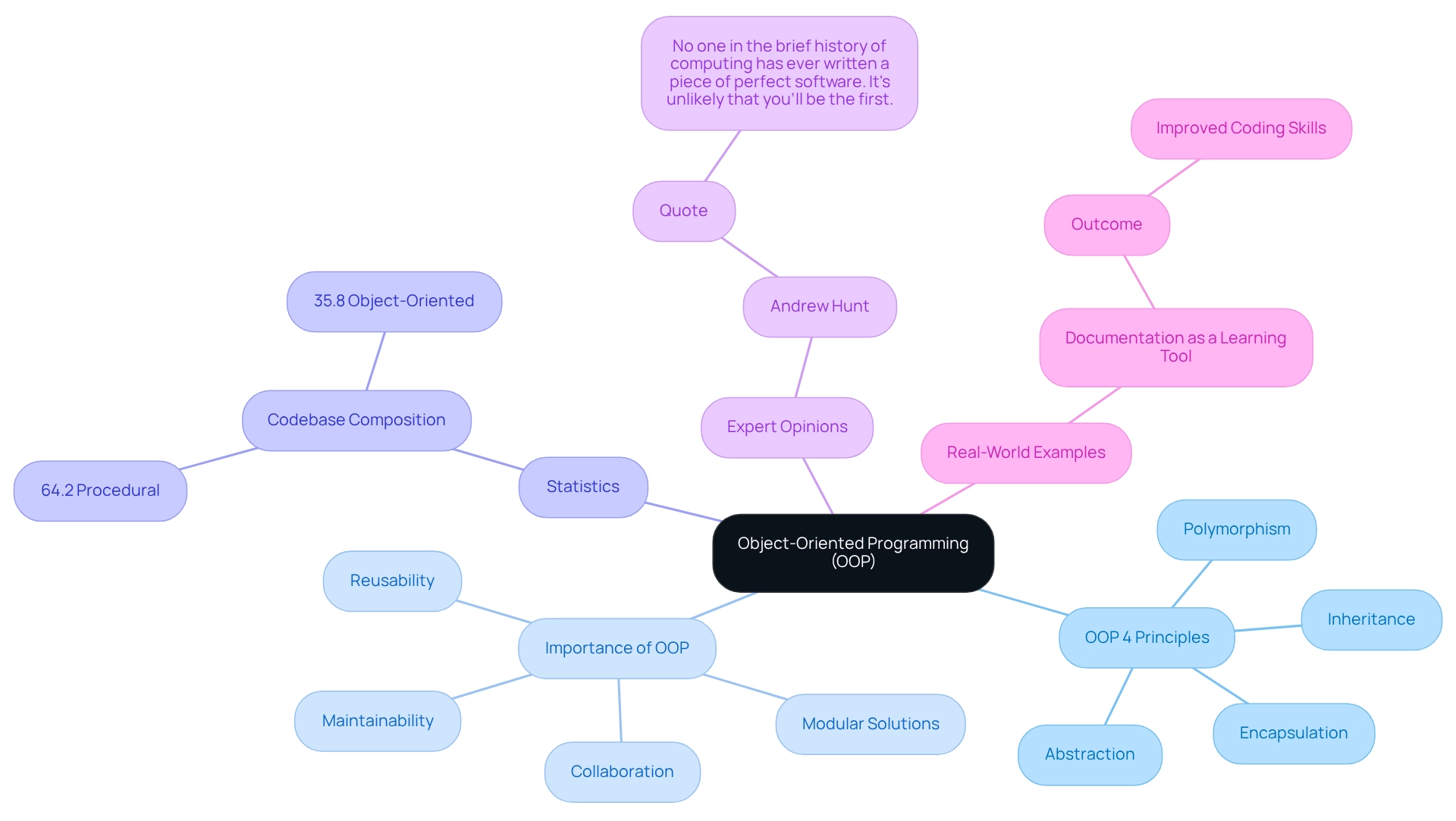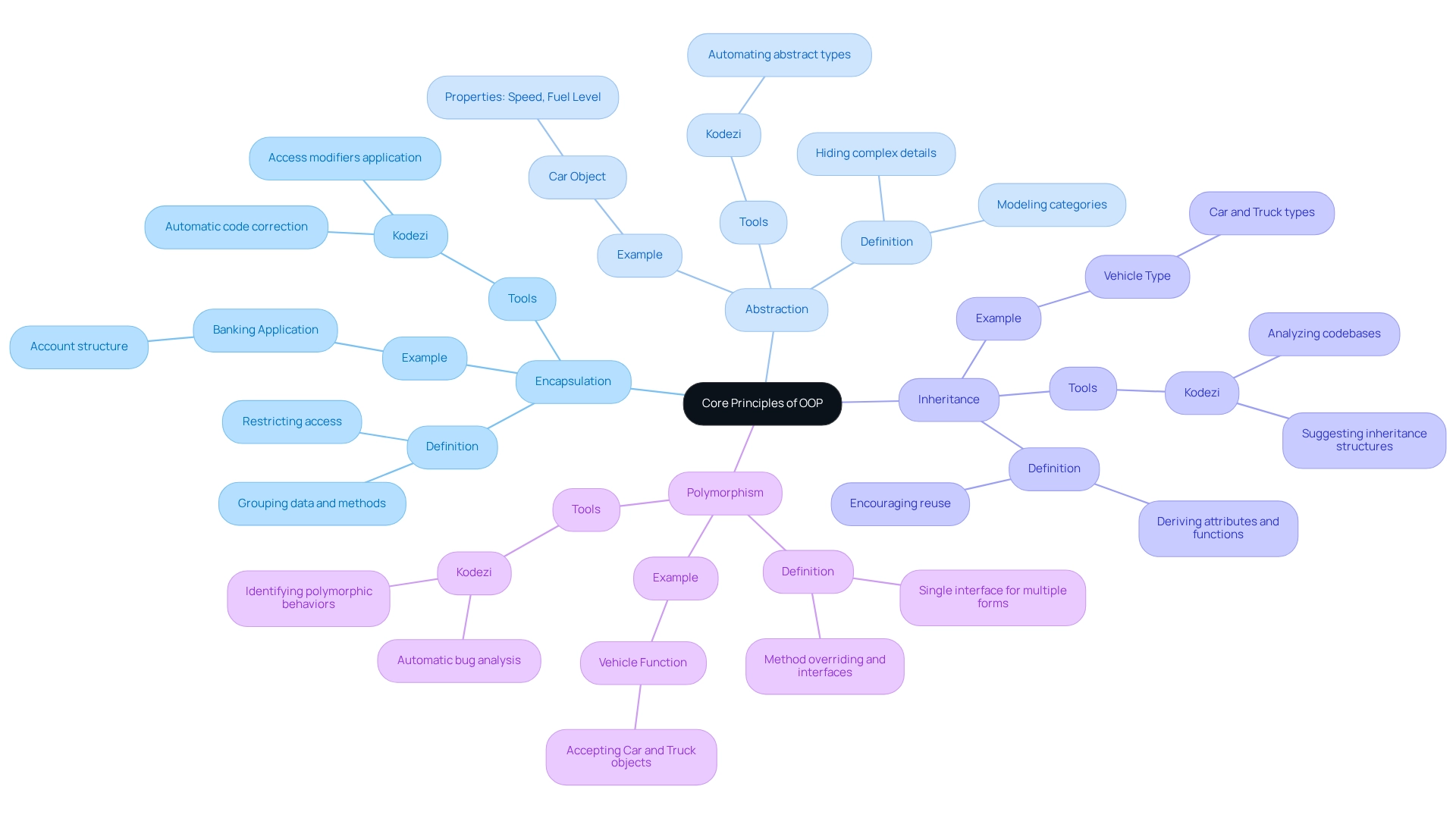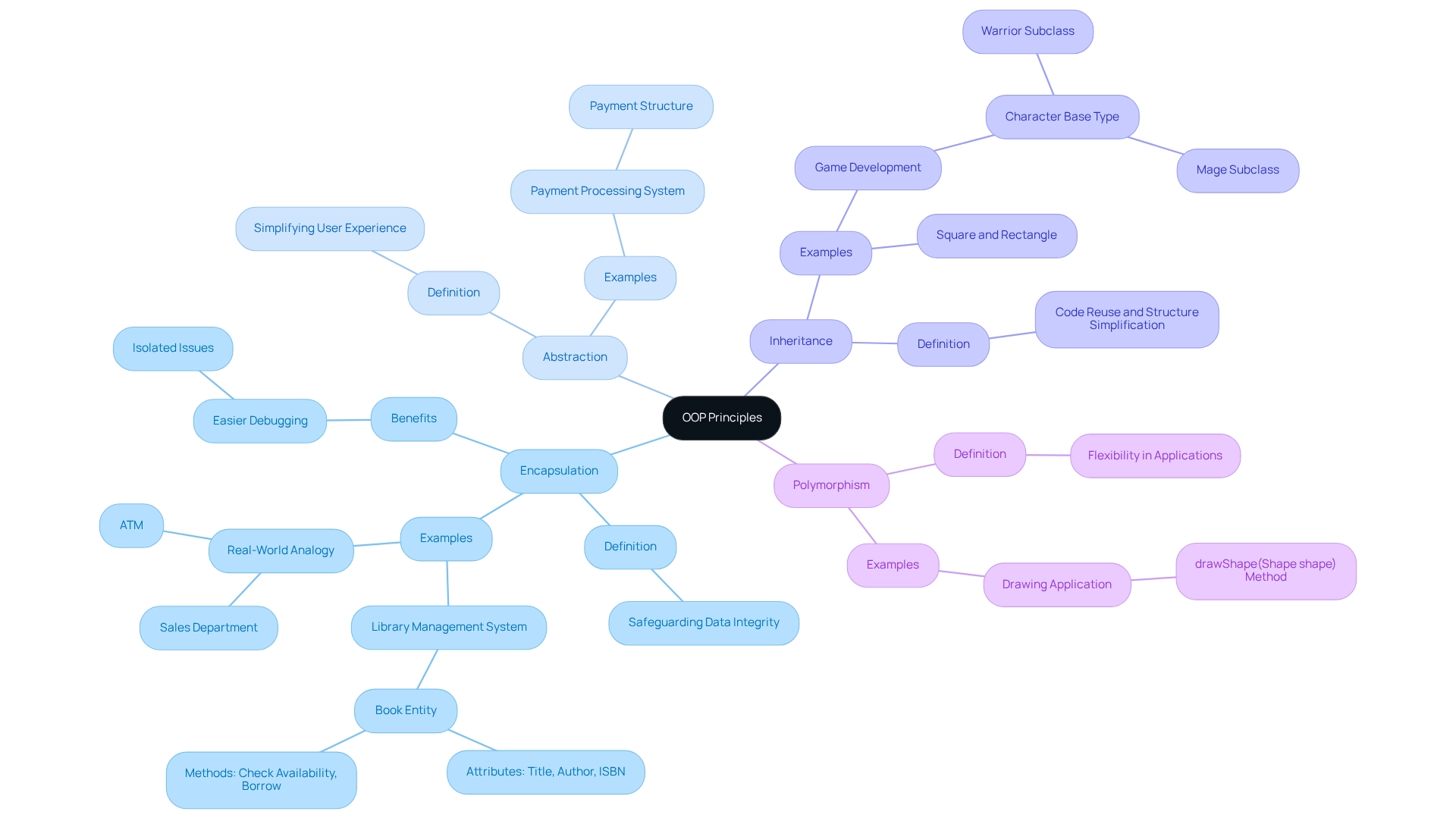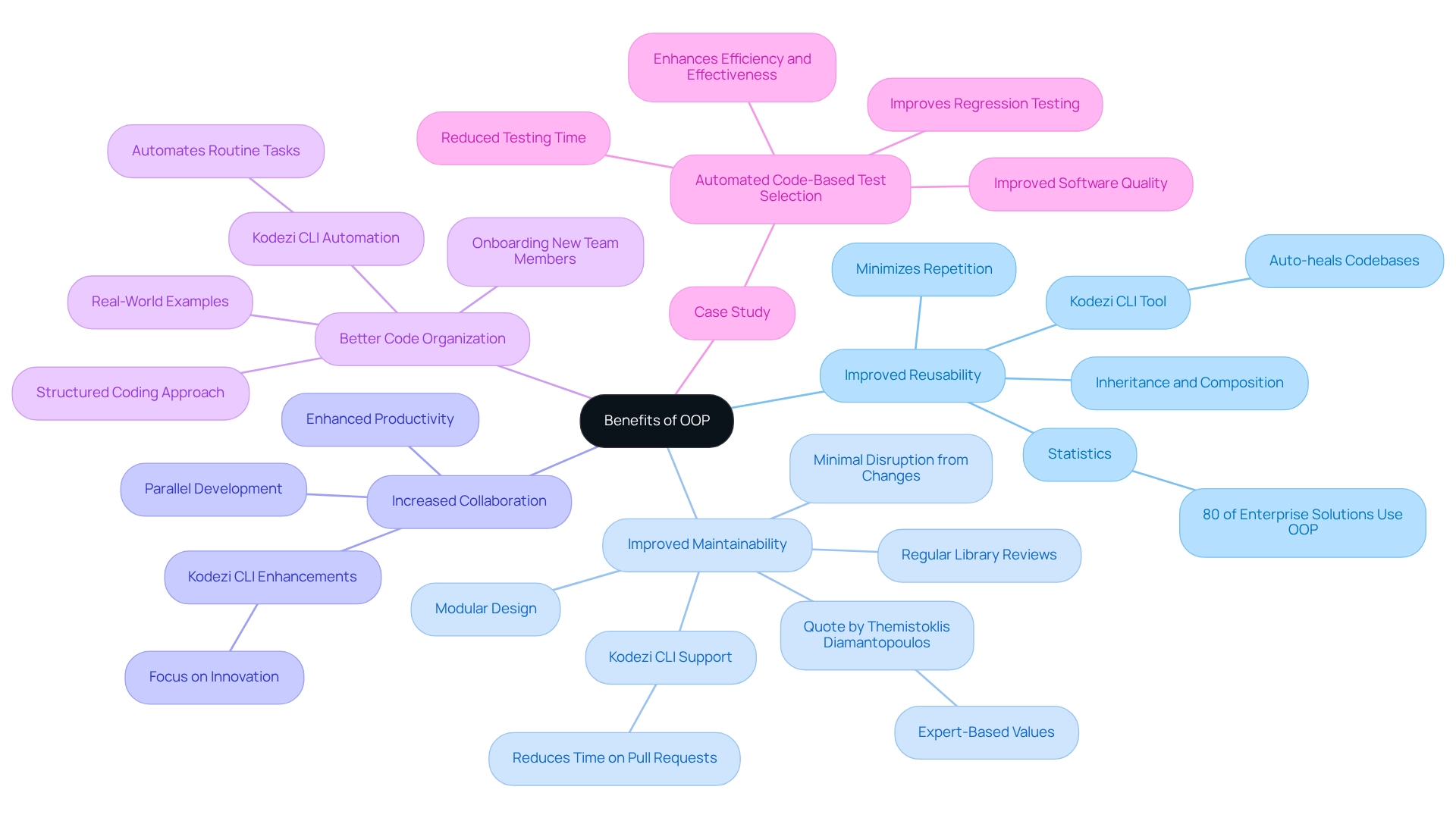Overview
In today's fast-paced software development landscape, developers often face significant coding challenges that can hinder productivity. Mastering the four principles of Object-Oriented Programming (OOP)—encapsulation, abstraction, inheritance, and polymorphism—can be a game changer. These principles not only enhance programming efficiency but also improve code organization, maintainability, and collaboration among developers.
So, how does Kodezi help address these challenges? By implementing specific features that align with OOP principles, Kodezi supports developers in overcoming common obstacles. For instance, encapsulation allows for better data management, while abstraction simplifies complex systems, making them more manageable.
The benefits of using Kodezi are clear: improved productivity and higher code quality. With real-world examples and statistics showcasing the increasing adoption of OOP in modern software development, Kodezi empowers developers to streamline their coding practices.
Are you ready to explore the tools available on the Kodezi platform? Discover how these features can transform your coding experience and lead to more efficient, high-quality software development.
Introduction
In the ever-evolving landscape of software development, developers frequently encounter significant coding challenges. Object-Oriented Programming (OOP) emerges as a transformative paradigm that reshapes how these challenges are approached. By structuring software design around objects rather than mere functions, OOP fosters an environment where code becomes modular, reusable, and easier to maintain. This approach mirrors real-world complexities, enabling programmers to manage intricate systems with greater ease.
Furthermore, as the industry continues to evolve, the significance of OOP is underscored by its growing adoption. Statistics reveal that nearly 36% of codebases are now object-oriented, highlighting its relevance. So, how does Kodezi enhance the OOP experience? With features designed to streamline coding practices, developers are better equipped to navigate the challenges of modern programming.
In addition, the core principles of OOP—encapsulation, abstraction, inheritance, and polymorphism—illustrate practical applications that bring substantial benefits to code quality and efficiency. For instance, encapsulation allows for better data management, while inheritance promotes code reusability. As developers leverage these principles, they can significantly improve their productivity.
Ultimately, exploring the tools available on the Kodezi platform can lead to enhanced coding practices and improved outcomes. Are you ready to elevate your coding experience and embrace the advantages that OOP and Kodezi offer?
Define Object-Oriented Programming and Its Importance
Object-Oriented Programming (OOP) is a programming paradigm that organizes design around data, or objects, based on the OOP 4 principles rather than exclusively on functions and logic. This methodology, which aligns with the OOP 4 principles, is essential in modern programming practices as it enables developers to produce modular, reusable, and maintainable solutions. By reflecting real-world entities, OOP simplifies the conceptualization and management of complex systems. The encapsulation of data and behavior within objects, a key aspect of the OOP 4 principles, not only improves code organization but also promotes collaboration among developers, resulting in more efficient application development processes.
The significance of OOP is underscored by recent statistics indicating that approximately 35.8% of codebases are object-oriented, while 64.2% remain procedural. This contrast emphasizes the ongoing evolution of programming paradigms and the increasing adoption of OOP in contemporary development. Furthermore, expert opinions reinforce its importance; as Andrew Hunt aptly noted, "No one in the brief history of computing has ever written a piece of perfect software. It's unlikely that you'll be the first." This viewpoint highlights the importance of strong programming practices, such as the OOP 4 principles, which can aid in reducing errors and enhancing software quality through improved organization and structure.
Real-world examples demonstrate how OOP enhances program organization. For instance, in a case study titled "Documentation as a Learning Tool," developers who effectively utilized documentation within an OOP framework reported enhanced learning from their mistakes, leading to improved coding skills over time. This method not only assists in debugging but also corresponds with the increasing trend of incorporating data analytic techniques into software development, ensuring that programs remain relevant and efficient.
In 2025, the trend towards OOP continues to gain momentum, with developers increasingly recognizing the benefits of the OOP 4 principles, including improved organization, enhanced collaboration, and streamlined maintenance. Tools like Kodezi further empower developers by providing automated code debugging, performance optimization, and security compliance, which are essential for maintaining high-quality codebases. As the software landscape evolves, the OOP 4 principles remain foundational, enabling developers to build high-quality, scalable applications while enhancing productivity and debugging efficiency.

Explore the Four Core Principles of OOP: Encapsulation, Abstraction, Inheritance, and Polymorphism
Coding can be challenging, especially when it comes to effectively implementing the OOP 4 principles. Developers often struggle with ensuring data integrity and code maintainability. Encapsulation addresses these challenges by grouping data (attributes) and methods (functions) that operate on that data into a single unit or structure. By restricting direct access to certain components of an object, encapsulation helps prevent accidental data modification. For example, in a banking application, the account balance can be encapsulated within an Account structure, allowing only designated methods to modify it, thereby enhancing security and integrity. Tools like Kodezi can assist in implementing encapsulation effectively by automatically correcting code and ensuring that access modifiers are appropriately applied.
Furthermore, abstraction simplifies complex realities by modeling categories based on essential properties and behaviors of objects. It enables developers to focus on high-level interactions without delving into intricate details. For instance, a car can be represented as an object with properties like speed and fuel level, while the internal workings of the engine remain hidden. This approach not only streamlines development but also enhances software maintainability and clarity. Kodezi's AI-driven capabilities can assist in automating the creation of abstract types, simplifying the process for developers to uphold clarity in their code.
Inheritance allows a new type to derive attributes and functions from a pre-existing type, encouraging reuse of programming elements and creating a hierarchical relationship. For instance, a Vehicle type can function as a foundation for Car and Truck types, which inherit shared attributes like wheels and engineType while incorporating their distinct features. This promotes a more structured organization and minimizes redundancy. Kodezi can further enhance this process by analyzing existing codebases and suggesting optimal inheritance structures.
Similarly, polymorphism enables objects to be treated as instances of their parent class, allowing a single interface to represent different underlying forms (data types). This can be achieved through method overriding or interfaces. For instance, a function that accepts a Vehicle type can operate on both Car and Truck objects, demonstrating flexibility in code design. This adaptability is crucial for developing scalable and efficient software solutions. Kodezi's capabilities in automatic bug analysis can help identify polymorphic behaviors that may lead to runtime errors, ensuring smoother execution. By leveraging Kodezi's unique features, such as the Kodezi CLI for teams, developers can enhance their implementation of the OOP 4 principles, leading to more efficient and effective programming practices. Kodezi's ability to support multiple languages and IDEs further solidifies its position as a versatile tool for programmers looking to improve their coding skills and productivity.

Apply OOP Principles: Real-World Examples and Use Cases
Developers often encounter significant challenges in managing complex systems and maintaining code quality. One effective approach to tackle these issues is through the OOP 4 principles of Object-Oriented Programming. For instance, encapsulation plays a crucial role in safeguarding data integrity within a library management system. The Book entity encapsulates essential attributes such as title, author, and ISBN, along with methods for checking availability and borrowing. This encapsulation ensures that modifications occur only through defined methods, simplifying debugging and enhancing maintainability. Without proper encapsulation, developers face more significant maintenance and debugging challenges, as noted by upGrad.
Furthermore, abstraction is another key principle that enhances user experience. In a payment processing system, the Payment structure abstracts the complexities of various payment methods, allowing users to complete transactions through a straightforward interface. This design enables users to focus on the task at hand without needing to understand the intricate underlying processes.
In addition, inheritance simplifies structure and promotes code reuse. In game development, a base type Character can be inherited by subclasses such as Warrior and Mage, each possessing unique abilities while sharing common attributes like health and level. For example, a Square class can inherit attributes from a Rectangle class, demonstrating how inheritance minimizes redundancy and streamlines the development process.
Similarly, polymorphism offers flexibility in applications. In a drawing application, a method drawShape(Shape shape) can accept any shape object, such as Circle or Square, invoking the appropriate draw method for that shape. This dynamic behavior significantly enhances the application's extensibility and adaptability.
Real-world analogies of encapsulation can be observed in everyday situations where internal workings are hidden, allowing only limited actions. For example, a sales department operates with customer data secured behind a system that permits specific interactions, similar to how encapsulation secures data in software systems. For those interested in deepening their understanding of the OOP 4 principles, exploring resources such as Python OOP tutorials and guides on mastering Python can be highly beneficial.

Understand the Benefits of OOP: Enhancing Code Quality and Efficiency
- Improved Reusability: The OOP 4 principles significantly enhance reusability through mechanisms like inheritance and composition. This method minimizes repetition and accelerates development duration, enabling developers to utilize existing resources effectively. Have you considered how tools like Kodezi CLI can streamline this process? Often referred to as the Swiss-Army knife for programmers, Kodezi CLI allows teams to quickly auto-heal codebases, ensuring that reusable components are always up-to-date. Notably, statistics reveal that approximately 80% of enterprise solutions employ the OOP 4 principles to enhance scalability and maintainability, underscoring its significance in contemporary application development.
- Improved Maintainability: OOP promotes a modular design by organizing code into separate entities, which simplifies the process of updating and maintaining applications. This modularity ensures that changes in one area of the codebase can be implemented with minimal disruption to other components, thereby enhancing overall maintainability. Have you experienced the benefits of Kodezi CLI in this context? It supports teams by allowing them to auto-heal codebases in seconds, reducing time spent on pull requests and maintaining project efficiency over time. Regular reviews of libraries and frameworks can further prevent performance issues. As Themistoklis Diamantopoulos notes, "Although there are several interesting approaches in this area, several of them actually employ expert-based values again," highlighting the importance of structured methodologies like the OOP 4 principles for maintaining high standards.
- Increased Collaboration: The design of OOP facilitates collaboration among developers, enabling multiple team members to work on different classes concurrently. This parallel development enhances productivity and reduces bottlenecks, allowing teams to deliver high-quality products more efficiently. How can Kodezi CLI enhance your collaborative efforts? By quickly resolving code issues, it allows developers to focus on innovation rather than troubleshooting.
- Better Code Organization: OOP encourages a structured approach to coding, which enhances the navigability and comprehensibility of the codebase. This clear organization is particularly beneficial for onboarding new team members and streamlining project management. Real-world examples illustrate how OOP practices have led to enhanced maintainability in projects, showcasing its effectiveness in promoting a collaborative and efficient development environment. Kodezi CLI acts as a Swiss-Army knife for programmers, further enhancing this organization by automating routine tasks and allowing developers to concentrate on core programming principles.
In a case study on automated code-based test selection for application product line regression testing, the implementation of the OOP 4 principles significantly enhanced the efficiency and effectiveness of regression testing processes. This outcome illustrates how OOP not only improves code quality but also contributes to better software performance and reliability, as the principles of OOP directly supported the enhancements in testing efficiency.

Conclusion
The challenges developers face in modern programming are significant, yet the transformative power of Object-Oriented Programming (OOP) offers a pathway to enhance software development practices. By structuring code around objects, OOP enables developers to create modular, reusable, and maintainable applications that reflect the complexities of real-world systems. The principles of encapsulation, abstraction, inheritance, and polymorphism not only contribute to better code organization but also facilitate collaboration among teams, leading to improved productivity and efficiency.
Furthermore, the application of OOP principles can significantly enhance code quality. For instance, encapsulation protects data integrity, while abstraction simplifies interactions with complex systems. Inheritance promotes code reuse, and polymorphism allows for flexible and dynamic programming. Tools like Kodezi play a vital role in streamlining these practices, providing automated solutions that enhance coding efficiency and maintainability.
In addition, embracing OOP is essential for developers aiming to navigate the challenges of modern programming effectively. The growing adoption of OOP across the industry underscores its relevance and importance in creating high-quality software solutions. By leveraging the principles of OOP and utilizing tools that support these practices, developers can elevate their coding experience and achieve superior outcomes in their projects. The future of software development lies in the hands of those who harness the full potential of OOP and the innovative tools available to them.
Frequently Asked Questions
What is Object-Oriented Programming (OOP)?
Object-Oriented Programming (OOP) is a programming paradigm that organizes design around data, or objects, based on the OOP 4 principles, rather than solely on functions and logic.
Why is OOP important in modern programming practices?
OOP is essential in modern programming as it enables developers to create modular, reusable, and maintainable solutions, simplifying the management of complex systems by reflecting real-world entities.
What are the OOP 4 principles?
The OOP 4 principles include encapsulation, inheritance, polymorphism, and abstraction, which together improve code organization and promote collaboration among developers.
What percentage of codebases are object-oriented compared to procedural?
Approximately 35.8% of codebases are object-oriented, while 64.2% remain procedural, indicating the ongoing evolution and adoption of OOP in programming.
How does OOP contribute to software quality?
OOP enhances software quality through improved organization and structure, helping to reduce errors and promote strong programming practices.
Can you provide an example of how OOP enhances program organization?
In the case study "Documentation as a Learning Tool," developers using an OOP framework reported improved learning from their mistakes, leading to better coding skills and easier debugging.
What tools are available to support OOP practices?
Tools like Kodezi provide automated code debugging, performance optimization, and security compliance, which are essential for maintaining high-quality codebases.
What is the trend for OOP in the future?
The trend towards OOP is expected to continue gaining momentum, with developers increasingly recognizing the benefits of the OOP 4 principles, including improved organization, collaboration, and maintenance efficiency.




